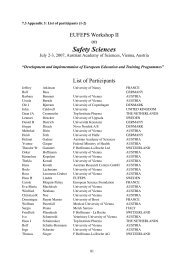2011 Anniversary Yearbook - EUFEPS today and history
2011 Anniversary Yearbook - EUFEPS today and history
2011 Anniversary Yearbook - EUFEPS today and history
Create successful ePaper yourself
Turn your PDF publications into a flip-book with our unique Google optimized e-Paper software.
International Pharmaceutical Federation<br />
(FIP) is working on a database of<br />
education. <strong>EUFEPS</strong> indicated that it<br />
would be open to collaborate by e.g.<br />
exchanging available information.<br />
Pharmaceutical sciences courses are the<br />
premier concern of <strong>EUFEPS</strong>. In FIP, there<br />
is a much stronger professional pharmacy<br />
theme. If there is overlap, it would not be<br />
a big problem. Options to identify relevant<br />
courses of interest just increase.<br />
Specialist Training<br />
There are several emerging new initiatives,<br />
all over Europe, to start specialist training<br />
in pharmaceutical sciences. <strong>EUFEPS</strong><br />
welcomes these, of course, as well as<br />
strongly supports the idea of establishing<br />
Master in Drug Development <strong>and</strong> Drug<br />
Discovery programmes.<br />
Since specialist training would take<br />
more than one or two short courses,<br />
during the summer or during the school<br />
year, an orchestrated action by a number<br />
of centres of excellence would be needed.<br />
We require a visionary <strong>and</strong> able conductor,<br />
or conducting team, who could make sure<br />
that such an orchestra would perform<br />
enjoyable music. Certainly, this is not<br />
just an interest for future pharmaceutical<br />
specialists. Europe will need them to<br />
develop new, safe medicines for its own<br />
citizens <strong>and</strong> other populations.<br />
Quality ’starting materials’<br />
To achieve a high st<strong>and</strong>ard for a product,<br />
the quality of the “starting materials” is<br />
crucial. Furthermore, the materials must<br />
be h<strong>and</strong>led well during the production<br />
process. Obviously, there is a growing<br />
concern in several European countries<br />
about the quality of the undergraduate<br />
pharmacy training. This concern seems<br />
to be shared by European Pharmaceutical<br />
Students’ Association (EPSA), who<br />
recently initiated a scientific supplement<br />
to their Newsletter.<br />
In a recent article, the Executive<br />
Director of the Swedish Pharmaceutical<br />
Society/Academy of Pharmaceutical<br />
Sciences, Prof. Björn Lindeke, discussed<br />
(in Swedish) risks with establishing<br />
new schools of pharmacy (in Sweden).<br />
The challenge is to meet the required<br />
numerical output for the pharmacy<br />
profession 2 . Since the basic training is<br />
the same for a professional pharmacist<br />
<strong>and</strong> a scientific career, there may not be a<br />
sufficient number of good quality students<br />
<strong>and</strong> teachers to provide a solid base for a<br />
career in the pharmaceutical sciences, he<br />
argues. In other countries, there are strong<br />
movements to reduce the scientific contents<br />
of the curricula in schools of pharmacy, in<br />
favour of professional pharmacy. If these<br />
are trends, <strong>and</strong> they cannot be reversed,<br />
the unique pharmaceutical sciences profile<br />
may be in jeopardy.<br />
Of course, one solution would be<br />
for the students, who aim for a scientific<br />
career, to leave their home country for a<br />
school or a university where appropriate<br />
training is provided. If there will be not<br />
a sufficient number of quality schools<br />
XXXVII<br />
available in Europe to meet the industrial<br />
drug research needs, Europe will also be<br />
in jeopardy. Students, graduates <strong>and</strong> postgraduates<br />
will go elsewhere, as will the<br />
industry.<br />
These issues are not explicitly<br />
discussed in the current <strong>EUFEPS</strong><br />
Strategic Plan, for 2002–2006. With hard<br />
information about the current situation,<br />
such issues would certainly be considered<br />
in the next Strategic Plan.<br />
Other Regions<br />
It is in the Strategic Plan 2002–2006<br />
that <strong>EUFEPS</strong> should collaborate on<br />
pharmaceutical sciences training both in<br />
its own geographical region <strong>and</strong> in others.<br />
The FIP Board of Pharmaceutical Sciences<br />
(BPS) <strong>and</strong> the American <strong>and</strong> Japanese<br />
pharmaceutical sciences organisations<br />
are, for example, collaborating on thirdworld<br />
programmes.<br />
Perhaps, the global platform for<br />
advancing the pharmaceutical sciences,<br />
FIP BPS, will be the best level for<br />
coordinating such efforts, jointly<br />
supported by pharmaceutical associations<br />
<strong>and</strong> federations of all regions.<br />
1 Workshop Report: Future Training<br />
Needs in Pharmaceutical Sciences; www.<br />
eufeps.org<br />
2 Lindeke, B.: Den blomstr<strong>and</strong>e tid<br />
som kom; Elixir (Apotekarsocietetens<br />
medlemstidning) 2/2003




